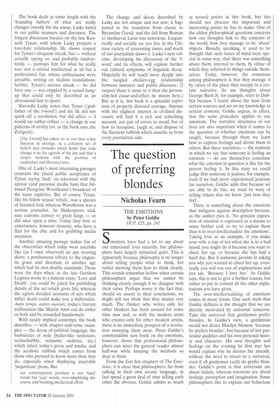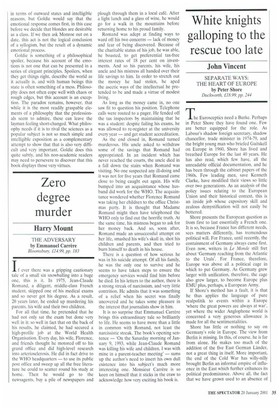The question of preferring blondes
Nicholas Fearn
THE EMOTIONS by Peter Goldie OUP, £25, pp. 241 Scientists have had a lot to say about our emotional lives recently, but philosophers have largely remained quiet. This is apparently because philosophy is no longer about telling people what to think, but rather showing them how to think clearly. This sounds somewhat hollow when certain philosophers argue that we cannot be thinking clearly enough if we disagree with their views. Perhaps worse is the fact that, should we assent to their conclusions, we might still not think that they matter very much. The thinker who writes only for other thinkers has been around for some time now and, as with the modern artist who creates only for other modern artists, there is no immediate prospect of a revolution sweeping them away. Peter Goldie's commendable new book on the emotions, however, shows that professional philosophers can meet the general reader almost half-way while keeping the methods so dear to them.
From the first few chapters of The Emotions, it is clear that philosophers, far from talking in their own arcane language, in fact spend a great deal of time telling each other the obvious. Goldie admits as much at several points in this book, but this should not obscure the important and interesting points he has to make. One of the oldest philosophical questions concerns how our thoughts link to the contents of the world, how they manage to be 'about' objects. Broadly speaking, it used to be thought that such states of mind were special in some way, that there was something about them, internal to them, by virtue of which they referred to things outside themselves. Today, however, the consensus among philosophers is that they manage it by virtue of the place they occupy in a certain narrative. So my thoughts about George Bush Jr, for example, refer to Dubbya because I learnt about the man from certain sources and act on my knowledge in certain contexts. Goldie argues, in effect, that the same procedure applies to our emotions. The narrative structures of our lives are also important when it comes to the question of whether emotions can be taught, because through them we learn how to express feelings and divine them in others. But these narratives — the contexts in which we say that someone is feeling an emotion — do not themselves constitute what the emotion in question is like for the person feeling it. In this story we could judge that someone is jealous, for example, even if we had never experienced jealousy for ourselves. Goldie adds that because we are able to do this, we must be wary of telling others that we know 'just how they feel'.
There is something about the emotions that mitigates against description because, as the author puts it, 'No genuine expression of emotion is expressed as a means to some further end; to try to explain them thus is to over-intellectualise the emotions'. Taking love as an example, if you make your wife a cup of tea when she is in a bad mood, you might do it because you want to cheer her up, or because she has had a hard day. But if someone persists in asking you why you wanted to cheer her up, eventually you will run out of explanations and just say, 'Because I love her.' As Goldie says, this is not to give a further reason, but rather to put in context all the other explanations you have given.
The over-intellectualising of emotions comes in many forms. One such myth that Goldie deflates is the thought that we are directly motivated by universal concerns. Take the universal that gentlemen prefer blondes. In Goldie's view, a gentleman would not desire Marilyn Monroe 'because he prefers blondes', but because of her particular qualities and his own personal history and character. His own thoughts and feelings on the evening he first met her would explain why he desires her already, without the need to resort to a universal, even if all gentlemen really do prefer blondes. Goldie's point is that universals are about beliefs, whereas emotions are about feelings, perception and imagination. Some philosophers like to explain our behaviour in terms of outward states and intelligible reasons, but Goldie would say that the emotional response comes first, in this case before we decide that blondes are desirable as a class. If we then ask Monroe out on a date, this act is not the logical conclusion of a syllogism, but the result of a dynamic emotional process.
Goldie is something of a philosophical spoiler, because his account of the emotions is not one that can be presented in a series of elegant principles. Spoilers, when they get things right, describe the world as it actually is, and with human beings this state is often something of a mess. Philosophy does not often cope well with chaos or rough edges, but this account is an exception. The paradox remains, however, that while it is the most readily graspable elements of a philosophy that the professionals seem to admire, these can leave the layman feeling short-changed. What philosophy needs if it is to rival the sciences as a popular subject is not so much simple and intelligible exposition as a complementary attempt to show that that is also very difficult and very important. Goldie does this quite subtly, and his non-academic readers may need to persevere to discover that this book displays those very virtues.































































 Previous page
Previous page